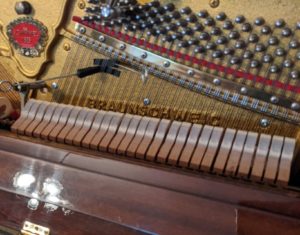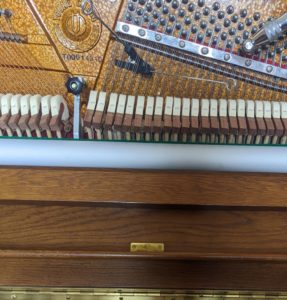I think one of the biggest surprises I come across, as a piano technician is how many piano owners don’t understand how a piano goes out of tune.
If someone doesn’t understand how a piano works, how will they know how to take care of it? The short answer, is that they won’t. That’s why there are so many pianos in circulation that are in disrepair and get passed along, for free, to a neighbor or someone on Craiglist, and the like. Part of my job, as a piano technician, is to educate my clients on how their piano functions and how to take care of it. This is so important, because pianos can be a bit of a mystery to many- musicians included.

So, why do pianos need to be tuned? To understand this why, one must understand what’s inside. The exterior, or cabinet, of a piano is a lovely housing for the structure and mechanics that are all inside. The action, which are all of the moving parts, are a blog post for another day. This post will focus on the structure, which includes the pinblock, pins, soundboard, and strings. To break it down in really simplistic terms, a piano’s structure is made out of wood. The wood houses tuning pins that are drilled into that wood. The strings, which are steel, are wound around the tuning pins and tightened by the pins being turned into the wood pinblock. The strings are held so tight that they hold approx 18-30 tons depending on the size of the piano. That’s a lot. It’s enough that when a string snaps, it could poke an eye out. The wood pinblock is taking the brunt of that string tension.
With all of that in mind, let’s consider what happens to wood when the weather changes. When the relative humidity is low, which is during cold months, wood shrinks. When relative humidity is high, which is during warm months, wood expands. With a piano, this means the wood holding all of that string tension and keeping the tuning pins in place is shrinking and expanding throughout the year. This is why pianos need regular tuning. They are constantly fluctuating in pitch all year long.

I like to think of piano tuning in terms of car maintenance. As car owners, we get the oil changed in our cars, even though our car is running just fine. We don’t wait until the car stops running because then it’s too late and we’ve done serious damage to our vehicle. We get the oil changed before that happens, so that the car continues to run optimally. This is why a piano should be tuned and serviced AT LEAST once per year. Twice per year, or even three times per year is ideal. However, realistically, most people go with once per year and that’s ok. It’s just important to stay on a regular maintenance schedule so that the ebbs and flows of the piano’s structure are minimal and easy to manage.
Need to schedule a piano tuning? If you’re in my area, SCHEDULE a tuning!
